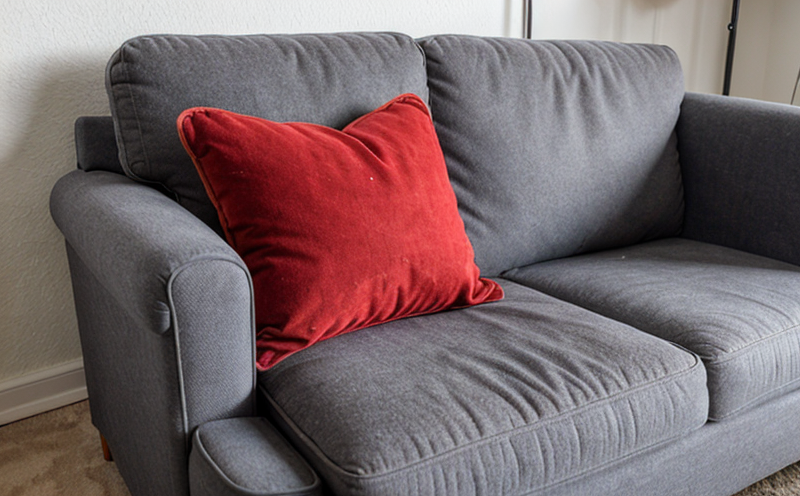BS EN ISO 11640 Colour Fastness to Rubbing of Upholstery Leathers
The BS EN ISO 11640 test standard is specifically designed to evaluate the colourfastness properties of upholstery leathers. This test assesses how resistant a leather material's colour is to rubbing and mechanical abrasion, ensuring that furniture remains visually appealing even after extended use or exposure to various environmental conditions.
Understanding the importance of this testing process for quality managers, compliance officers, R&D engineers, and procurement teams in the furniture sector is crucial. The durability and longevity of upholstery leathers directly affect customer satisfaction and brand reputation. By ensuring that the colourfastness meets the stringent requirements set by ISO standards, manufacturers can enhance their product’s marketability and ensure regulatory compliance.
The test involves rubbing a sample with a specified weight using a standard instrument to simulate real-world wear scenarios. The rubs are typically performed in a defined direction and repeated until the specified number of strokes is achieved. After each stroke, the colourfastness of the leather is assessed by comparing it against a control sample that has not undergone rubbing.
The BS EN ISO 11640 test provides critical insights into how well the upholstery leathers can withstand daily use and abuse in home or office settings. This information is invaluable for product development teams who aim to create products that offer long-term value and retain their aesthetic appeal over time.
By adhering to this standard, manufacturers demonstrate their commitment to quality and reliability. This not only helps in maintaining a competitive edge but also fosters customer trust and loyalty. The test results are essential for ensuring that the final product meets both internal quality control standards as well as external regulatory requirements.
| Parameter | Description |
|---|---|
| Test Method | The leather sample is rubbed against a standard rubbing pad using a specified weight and stroke count. |
| Specimen Preparation | The specimen should be preconditioned to ensure it is at a stable moisture content before testing. |
| Instrumentation | A standardized rubbing machine with a specific weight and stroke configuration. |
| Sampling | A minimum of five samples per batch are tested for accurate results. |
The BS EN ISO 11640 test is crucial in the upholstery leather industry as it provides a standardized method to assess colourfastness under rubbing conditions. This ensures consistency across different manufacturers and batches, thereby enhancing product quality and consumer satisfaction.
For furniture manufacturers, this test is not just about meeting regulatory requirements but also about setting higher standards for their products. By incorporating ISO 11640 into their quality assurance protocols, they can ensure that their upholstery leathers withstand the rigors of real-world use, maintaining their appearance and integrity over time.
Applied Standards
- BS EN ISO 11640:2017 - Colour fastness to rubbing of leather (upholstery leathers)
| Parameter | Description |
|---|---|
| Test Method | The leather sample is rubbed against a standard rubbing pad using a specified weight and stroke count. |
| Specimen Preparation | The specimen should be preconditioned to ensure it is at a stable moisture content before testing. |
| Instrumentation | A standardized rubbing machine with a specific weight and stroke configuration. |
| Sampling | A minimum of five samples per batch are tested for accurate results. |
The BS EN ISO 11640 test is designed to simulate real-world rubbing conditions, ensuring that the colourfastness of upholstery leathers remains consistent and reliable. This standard is widely recognized in both Europe and internationally, providing a robust framework for manufacturers.
By adhering to this standard, manufacturers can ensure that their products meet not only regulatory requirements but also exceed customer expectations. The test results provide valuable data that can be used to refine manufacturing processes and improve product quality continuously.
Eurolab Advantages
Eurolab offers a comprehensive range of services designed to help manufacturers in the furniture sector meet stringent standards like BS EN ISO 11640. Our team of experts provides tailored solutions that ensure compliance with international regulations, enhance product quality, and improve customer satisfaction.
- Expertise: Eurolab's technical staff are highly skilled in interpreting and applying the latest testing methodologies.
- Accurate Testing: We use state-of-the-art equipment to ensure precise and reliable test results.
- Comprehensive Reporting: Our detailed reports provide clear insights into the performance of your products, helping you make informed decisions.
- Fast Turnaround: Eurolab delivers timely results, allowing for quick feedback loops in product development cycles.
- Regulatory Compliance: With a deep understanding of global standards, we ensure that your products meet all necessary regulatory requirements.
At Eurolab, we are committed to helping you achieve the highest quality standards. Our services are designed to support your efforts in creating durable and aesthetically pleasing furniture that meets both current and future market demands.
Why Choose This Test
- Ensures consistent colourfastness across different batches of upholstery leathers.
- Provides valuable insights into the durability and longevity of your products.
- Maintains consumer trust by delivering high-quality, long-lasting furniture.
- Aids in regulatory compliance, ensuring that all products meet international standards.
- Supports product development by identifying areas for improvement and refinement.
- Enhances brand reputation through consistent quality assurance practices.
- Facilitates faster market entry by providing accurate test results.
The BS EN ISO 11640 test is a critical tool in the furniture industry. It helps manufacturers produce products that not only meet but exceed regulatory requirements, thereby ensuring customer satisfaction and loyalty.





